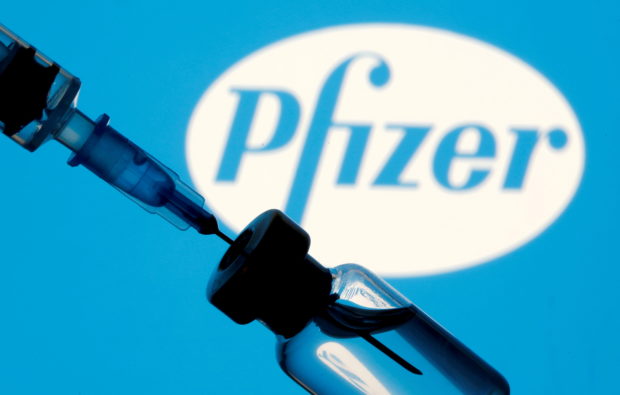
A vial and syringe are seen in front of a displayed Pfizer logo in this illustration taken Jan. 11, 2021. ( File photo from REUTERS)
MANILA, Philippines — The National Task Force Against COVID-19 (NTF) plans to allocate half of the 40 million Pfizer doses that will be delivered to the country in the coming months to younger people, according to vaccine czar Carlito Galvez Jr.
The government earlier signed with Pfizer representatives what Galvez had described as “the biggest and most decisive deal we have for 2021” that would allow the country to achieve herd immunity by the end of the year.
So far, the vaccine is the only brand approved by the local Food and Drug Administration for those between the ages of 12 and 17.
Keon, a 16-year-old incoming Grade 11 student interviewed by the Inquirer, was understandably excited about the prospect of being vaccinated before the end of the year. He has been cooped up at home since the start of the pandemic because of quarantine restrictions that prevent those below 18 or above the age of 65 from going out.
Unlike other people with reservations about getting jabbed, Keon is keen on receiving the Pfizer vaccine, saying, “It will make me less paranoid, knowing that I am protected against COVID-19.”
But even after being vaccinated, he intends to stay at home even if the government lifts the restrictions on younger people. “I will only go out when it’s really safe,” Keon said.
Advice from experts
In an interview with PTV 4 on Sunday, Galvez, the NTF’s chief implementer, said that the task force would seek advice from experts on pediatric vaccination, adding that COVID-19 immunization programs in European countries as well as in the United States and Israel, had already started giving jabs to those below 18.
“Once our pediatric experts [say] that we can already go [ahead] with the vaccination [of the younger population], considering that we already have enough vaccines, then we will…,” he said.
In an online message on Monday, vaccination deputy chief Vivencio Dizon also confirmed the government’s plan to administer Pfizer jabs to people in the younger age group, with priority to be given to those in the National Capital Region (NCR) Plus 8 area and COVID-19 “hot spots.”
He said that the delivery of the 40 million doses would be done in tranches beginning in August.
Asked about the deployment of the Pfizer vaccines, National Vaccination Operations Center and Health Undersecretary Myrna Cabotaje said that they were still waiting for directives from the NTF and Galvez.
“As of now, it’s [still] ‘focus and expand’ [from] NCR Plus 8 then to surge or [other] populated areas,” she added.
Keep prioritizing adults
A pediatric infectious diseases expert, however, disagreed with the task force’s plan to start vaccinating those in the younger age group, saying the government should stick to prioritizing the more vulnerable adults.
Dr. Benjamin Co said the government might also want to consider “reserving” the mRNA-type vaccines like Pfizer as boosters for adults since the country was using a “mixed bag of vaccines” with varying effectiveness against the newer coronavirus variants.
“If adults don’t get COVID-19, then there’s little chance children will get it… Let us exhaust vaccinating adults before we move on to children. [Besides], only 2 percent [so far of the population] have been fully immunized,” Co said.
With the Pfizer deal, the government has so far purchased 113 million vaccines from five manufacturers.
Along with the 44 million doses committed by the COVAX facility and one million Sinovac doses donated by China, the country is looking at 158 million total doses this year.
With the expected increase in vaccine supply, the government is on track to administer 500,000 doses a day, which means it could reach its target of inoculating 50 to 70 million Filipinos by the end of the year.
Presidential spokesperson Harry Roque was confident the government would be able to handle the expected increase in vaccine deliveries and administer the doses promptly.
He noted that on June 15, it was able to administer a total of 322,929 doses, the highest daily vaccination rate so far.
“We have proven that if there is enough supply, we can administer 322,929 doses per day. Of course, if the supply increases, 500,000 per day is no problem,” Roque said in a press briefing on Monday.
He added, however, that the government was not just relying on the Pfizer vaccines to achieve its goal of inoculating enough people to achieve herd immunity as it continued to administer other brands.
As of June 19, a total of 8.22 million doses have already been administered.
To reach herd immunity, 70 percent of the country’s estimated population of 110 million must be vaccinated.